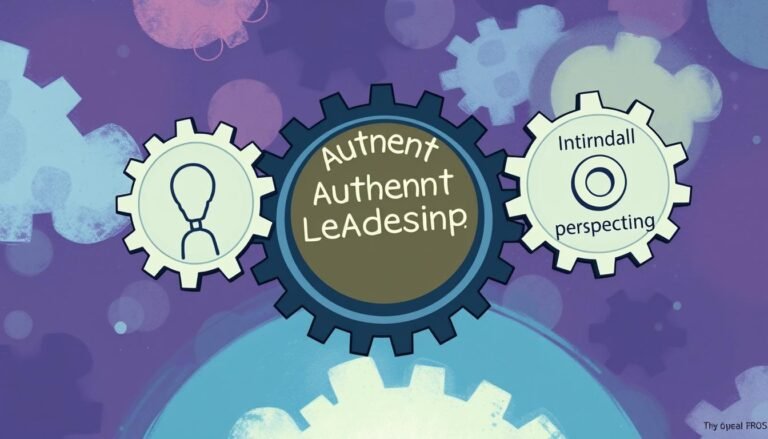Developing Emotionally Intelligent Leaders in the Irish Business Landscape
Picture this: It’s the last game in a big rugby series in New Zealand. The Irish team is ready for a special win after a long journey. Just like the Irish rugby team, today’s leaders need emotional intelligence, trust, and teamwork to stand out.
For 15 years, Adeo Consulting has led leadership development in Ireland. They mix emotional intelligence with new leadership ideas. Their Authentic Leadership Program strengthens leadership with trust and teamwork. This boosts not just individual work but the team’s success too. works with leaders in the public and private sectors. They help in shaping leaders ready for the future.
Key Takeaways
- Emotional intelligence is key in today’s work world, much like the focus and teamwork in sports.
- After 15 years, Adeo Consulting is well-known for its work in Ireland.
- Their Authentic Leadership Program increases trust and improves teamwork.
- Good leadership consulting means knowing what each leader needs, whether in private or public areas.
- Learning and using emotional intelligence can really change how well a business does.
The Importance of Emotional Intelligence in Leadership
Emotional intelligence is key for good leadership. It helps create positive work environments and better team work. Leaders with high emotional intelligence succeed in understanding and managing their feelings. They also help their teams handle emotions, too.
Understanding Emotional Intelligence
Emotional intelligence means being aware of and managing feelings, both yours and others’. You need to be good at understanding yourself, controlling your emotions, staying motivated, showing empathy, and getting along with others. High emotional intelligence helps leaders know their strengths and areas to improve. They can make good decisions because they understand themselves well.
Benefits of Emotional Intelligence in Business
Integrating emotional intelligence in leadership has big benefits. It makes work a better place and boosts teamwork. Leaders who can stay calm in tough situations make better choices. They motivate their teams to do great work by being goal-driven and tough. This creates an environment where everyone does their best.
Leaders who are good at empathizing and getting along with others build strong teams and help with morale. Studies show leaders with emotional intelligence do much better. For example, they are 90% more likely to succeed than those who score low. At a Motorola plant, 93% of workers were more productive after their leaders got emotional intelligence and stress management training.
Ireland is also seeing emotional intelligence as vital for leaders. 65% of workers say it’s crucial for good leadership. Companies that train their leaders in emotional intelligence see big boosts. They have 20% more engagement and productivity. Plus, they keep their employees 15% better than others. Emotional intelligence is crucial for a business to do well and to last.
Emotional Intelligence Training for Leaders in Ireland
In Ireland, getting better at emotional intelligence (EI) is key for leaders. This is even more true today due to higher rates of depression and anxiety. Almost 30% of the people are dealing with these issues. So, being emotionally strong is crucial for facing today’s problems. Leaders who are good at handling emotions and trust, like the Irish Rugby Team, help their teams do well.
Types of Emotional Intelligence Training Programs
There are many programs out there that can help with emotional intelligence. They focus on thinking skills, knowing yourself, controlling your actions, understanding others, and managing relationships. A lot of these programs use practical learning to change behaviors. Adeo Consulting, for example, mixes teaching and exercises to boost EI.
Choosing the Right Training Provider
Picking the right training program is very important. It needs to tackle today’s leadership issues directly and be real. Look for programs that talk about leading and managing separately. It’s also good if they use things like the Emotional Intelligence Competency Measure. The best programs work closely with learners to get the most out of the training.
- Customized Sessions: Address specific leadership challenges.
- Focus on Behavioral Change: Emphasize experiential learning.
- Relevancy: Ensure program content is up-to-date.
- Tools & Assessments: Use reliable measures of emotional intelligence.
| Criteria | Importance |
|---|---|
| Customization | High |
| Behavioral Focus | High |
| Relevance | Medium |
| Tools & Assessments | Medium |
Core Competencies for Developing Emotionally Intelligent Leaders
Building leaders with emotional intelligence is key for any group’s triumph. Efforts to raise skills like knowing your feelings and good social ties are important. They help leaders better handle people and create happy workplaces.
Self-Awareness and Self-Management
Spotting your feelings and handling them well are crucial for leading. This view by expert Daniel Goleman says these are top needs for emotive smart leaders. Understanding one’s emotions and how they affect actions and choices are vital.
Adeo Consulting pushes programs that encourage thinking about oneself and showing true feelings. Leaders deep in self-awareness can control their emotions and stay cool under stress. This skill helps them seem steady and think clearly, even when things are tough.
Social Awareness and Relationship Management
Knowing others’ feelings and needs is crucial for strong bonds. It’s good for teamwork too as empathetic leaders often do better. Social awareness and cognitive empathy help leaders focus on creating strong working relationships.
Relationship management is also crucial, per Goleman. It’s about handling how people interact well. Leaders who are good at this are great at talking and solving issues. They make sure team members feel heard and loved, crucial for work success.
As companies change, the need for emotional smarts in leading grows. By focusing on these people skills, leaders can better touch with their teams. This makes managing tough times easier and builds teams that can change and last.
Implementing Leadership Development Programs in the Irish Corporate Culture
Bringing leadership development programs into the Irish corporate world requires a deep look at its special traits. These programs must fit well with business plans, cultural habits, and adapt to changes. They help shape a strong foundation for changing the leadership culture.
Addressing Cultural Specifics
Leadership training in Ireland should value the unique Irish environment. It’s key to support leaders, especially in small and medium-sized companies. A focus on trust, teamwork, and always learning is vital. Personalized training helps leaders do well in Ireland’s business scene.
“In a study on leadership qualities in the Irish business landscape, 83% of respondents indicated that visionary thinking was the most valued trait in leaders.” – Irish Business Insights
Adapting Training to Business Needs
Good leadership programs mix business goals with how they train. They should meet the specific needs of different areas. Such programs help leaders deal with real challenges. Mixing group and individual training can work wonders. It boosts emotional skills and other important qualities.
- Leadership programs in Ireland are tailored for both Private and Public sectors, as seen in the success of Adeo Consulting Ltd.
- Over the past decade, Adeo Consulting Ltd has provided customized leadership training and mentoring for Senior Directors, CEOs, and mid-level leaders.
- Key components include enhancing self-awareness, emotional intelligence, and authenticity in leaders.
Good communication and forming strong alliances are essential in *aligning business strategy*. Recognizing successes makes the workplace better. Using tech and good management help in better decision making. This all-around effort aids in long-lasting success, especially for Irish small businesses.
Workplace Empathy: Building Stronger Teams
Empathy at work is key to strong teams. It’s part of emotional intelligence. Empathy means understanding and feeling what others feel. This helps team members really get each other. Companies that value this keep their best people and have less turnover, especially after COVID.
Role of Empathy in Team Dynamics
Empathy makes team relationships better. It helps when working from home too. BDA expert Aidan Higgins says, listening well and being thankful makes teams do better. It keeps everyone happy.
Strategies to Foster Empathy
To grow empathy in teams, try many things. Here’s what you can do:
- Listen well to really get what team members are saying.
- Make work a place where everyone feels part of the team.
- Show thanks often for what each person does.
- Meet with people one-on-one to talk about what they do well.
- Find out how each person likes to be thanked, and then thank them that way.
Teamwork has become more important over the years, with more time spent together. Almost everyone thinks emotional intelligence is crucial at work. So, building empathy is really important for teams to work well.
Boosting Emotional Quotient (EQ) through Soft Skills Coaching
Boosting a leader’s Emotional Quotient (EQ) is key in today’s business world. Soft skills coaching is a great way to do this. It focuses on skills like empathy, communication, and being adaptable.
Adeo Consulting says these skills are super important. They help leaders deal with our fast-changing world. By working on these skills, companies can have leaders who are better at understanding emotions.
Key Soft Skills for Leaders
Key soft skills, important for EQ, are:
- Empathy: This means understanding and sharing other people’s feelings. More empathy means better team relationships and support.
- Communication: Good communication lets leaders share ideas clearly. It also means listening well, creating open teamwork.
- Adaptability: Adapting to new situations and changes easily is crucial nowadays.
- Self-Awareness: Knowing how your own emotions affect you. It’s key to growing and leading better.
- Social Skills: These are important for building good relationships in and outside your team.
Effective Coaching Techniques
The right coaching methods are crucial for emotional intelligence improvement. They include:
- One-on-One Sessions: Tailored coaching that meets personal goals and needs.
- Feedback Mechanisms: Using feedback often to work on EQ weaknesses and strengths.
- Role-Playing Scenarios: Simulations of real-world events to improve empathy and communication.
- Collaborative Learning: Working with others to get feedback and grow together in emotional intelligence.
A good emotional intelligence coaching approach can do a lot. It can greatly improve a leader’s emotional intelligence and make them better and stronger in their roles.
Utilizing Emotional Agility Workshops in Leadership Training
Emotional agility workshops are key in adaptive leadership training. They help leaders learn essential skills for today’s fast-paced world. These programs improve how leaders react to new situations by developing agile emotional coping strategies.
With recent GDPR changes, HR teams faced tough employee pushback. Emotional agility in leadership is vital here. Workshops help leaders boost their emotional intelligence (EQ). This leads to more empathy and better teamwork, crucial during big changes like GDPR.
Encouraging openness and vulnerability in HR builds a strong, trusting culture. Leaders focusing on self-awareness and adaptability can guide their teams through feedback. This makes the team better at handling change and working through challenges. So, using emotionally agile techniques is critical for strong and creative leadership.
For leaders to embrace emotional agility, they need support and clear programs. They learn to deal with tough emotions by making values-based choices. This builds a workplace that flexes and grows through adversity, improving skill and resilience.
Many methods are used in emotional agility workshops:
- Practical exercises to practice emotional openness and vulnerability
- Masterclasses that teach and offer strategies
- Case studies showing techniques in use
These steps help leaders understand how they influence their team’s success. They create a workspace that promotes adaptability and resilience. By joining these workshops, leaders become better at handling emotions. They improve their decision-making and team relations.
| Component | Benefit |
|---|---|
| Practical Exercises | Enhances emotional response flexibility |
| Masterclasses | Combines theory and practical strategies |
| Case Studies | Demonstrates real-world applications |
| Executive Sponsorship | Ensures structured leadership awareness |
Emotional Competence Assessments: Measuring Leadership Effectiveness
Today, in the fast-changing business world, measuring leadership’s success is crucial. Emotional competence assessments do just that. They use emotional intelligence data to show how well a leader is doing. These tests show what really matters for success, often more than just being smart.
Types of Emotional Competence Assessments
There are a few kinds of emotional competence tests:
- Self-Assessments: These are tools that let leaders look at their own emotional intelligence. This can help them grow.
- 360-Degree Reviews: This method gets feedback from everyone a leader works with: peers, people who report to them, and bosses.
- Custom EI Surveys: These are made for the specific needs of an organization. They show exactly where a leader stands in emotional intelligence.
Implementing Assessments in the Workplace
Using these tests in your business can be a game-changer. They show where leaders are doing well and where they can improve. This guides specific plans to grow. Plus, checking in regularly helps leaders keep getting better.
This leads to teams that work together better and achieve more.
| Assessment Type | Focus | Method |
|---|---|---|
| Self-Assessment | Personal Reflection | Questionnaires/Surveys |
| 360-Degree Review | Comprehensive Feedback | Multisource Inputs |
| Custom EI Survey | Tailored Insights | Specific Organizational Metrics |
Using these tests helps organizations pick smarter ways to grow their leaders. It also builds better emotional skills in teams.
Conclusion
The road to becoming a better leader in Ireland is all about understanding and using emotional intelligence. It’s key to making performance better over time. Emotional intelligence includes knowing yourself and how to handle your emotions. It also means understanding others and building good relationships.
According to the Harvard Business School, leaders who are emotionally intelligent can really connect with their teams. They can talk well and solve problems while dealing with hard, changing situations.
This journey is very important for new businesses in Ireland. Leaders who score high in emotional intelligence make better choices when things are tough. They also boost how well their teams work by a lot. These leaders are good at solving issues and make their teams feel more motivated and involved.
Many leaders in new companies work hard to improve their emotional intelligence. This means they reflect on their feelings and what might make them react in a bad way. Companies have tools like LectaTests to help leaders grow. Studies show that 90% of these leaders see real changes in six months.
By focusing on emotional intelligence, Irish companies can do better over time and become more creative. This helps create a culture where everyone works well together and is ready for the future.
FAQ
What is Emotional Intelligence and why is it important for leadership?
Emotional Intelligence (EI) is understanding and handling feelings, your own and others’. It boosts leadership by enhancing team engagement, trust, and performance in business.
How do leadership development programs enhance emotional intelligence in the Irish business landscape?
Irish leadership programs focus on EI skills like trust and engagement. Adeo Consulting designs programs that fit Irish business needs.
What are the benefits of emotional intelligence in business?
Leaders with high EI see a 25% increase in team performance and more engagement. They also build better workplace relationships and achieve higher business goals.
What types of emotional intelligence training programs are available for leaders in Ireland?
Programs in Ireland offer various learning methods, including workshops and coaching. These aim to boost emotional intelligence for leaders.
How do you choose the right emotional intelligence training provider for leaders?
Choose a training provider that meets specific leadership needs and stresses emotional intelligence over just managing. They should align with your business’s culture and goals.
What core competencies are crucial for developing emotionally intelligent leaders?
Key competencies include knowing yourself, managing emotions, understanding others, and handling relationships well. They’re essential for leading and supporting a team wisely.
How does workplace empathy contribute to building stronger teams?
Empathy at work improves communication and understanding among team members. This leads to teams that work well together and achieve more.
What are key soft skills essential for leaders to enhance their emotional quotient (EQ)?
Important soft skills are empathy, good communication, and flexibility. Enhancing these through coaching boosts a leader’s emotional intelligence, key in fast-changing businesses.
What role do emotional agility workshops play in leadership training?
Emotional agility workshops make leaders more emotionally flexible. This is crucial for dealing effectively with the rapid changes in business environments.
How do emotional competence assessments help measure leadership effectiveness?
These assessments, like self-reviews and 360-degree feedback, pinpoint leaders’ strengths and areas needing growth. They help focus on necessary developmental areas.
Source Links
- Leadership, Emotional Intelligence and Team Development in Ireland
- Leadership Archives – Leadership, emotional intelligence & high performance teamwork in Ireland.
- Tangent, Trinity’s Ideas Workspace – Masterclass in Emotional Intelligence for Future Leaders – Courses
- The Power of Emotional Intelligence in HR Leadership
- Why Emotional Intelligence is Key to Leadership and Employee Development
- Importance Of Emotional Intelligence In Effective Leadership – EILM.EDU.EU
- Emotional Intelligence Archives – Leadership, emotional intelligence & high performance teamwork in Ireland.
- Enhancing the Emotional Intelligence of Leaders and Managers
- Emotional Intelligence At Work
- Evolving Leadership for AI Delivery | Irish Funds Industry Association | International Investments
- What Makes a Leader? Daniel Goldman – BUSINESS & LEADERSHIP
- Striking the Balance: The Power of IQ + EQ in Leadership
- Empowering Leaders: Unleashing Potential for Business Growth
- Leadership Training in Ireland – Group and Individual Programs
- Effective Leadership in the Irish Business Landscape
- Motivation Archives – Leadership, emotional intelligence & high performance teamwork in Ireland.
- 5 Steps to Building an Emotionally Intelligent Team – HSI
- New EY US Consulting study: employees overwhelmingly expect empathy in the workplace, but many say it feels disingenuous
- Emotional intelligence, leadership, and work teams: A hybrid literature review
- EQ: Why leaders are looking for ’emotional intelligence’
- Irvine Nugent: Leadership through Emotional Intelligence
- Emotional intelligence training: the path to exceptional people management
- Emotional Agility & Leadership: Navigating Change with Resilience – TTM Associates
- Emotional Intelligence Archives – Leadership, emotional intelligence & high performance teamwork in Ireland.
- The Emotional Intelligence Competencies Every Leader Needs
- Microsoft Word – ESCI user guide June 2011.doc
- Emotional Intelligence in Leadership: A Key Skill for the Modern Workplace
- The Role of Emotional Intelligence in Leadership and Business Success
- The Power Of Emotional Intelligence In Leadership: Enhancing Workplace Relationships And Performance
- The Importance of Emotional Intelligence in Startup Leadership








